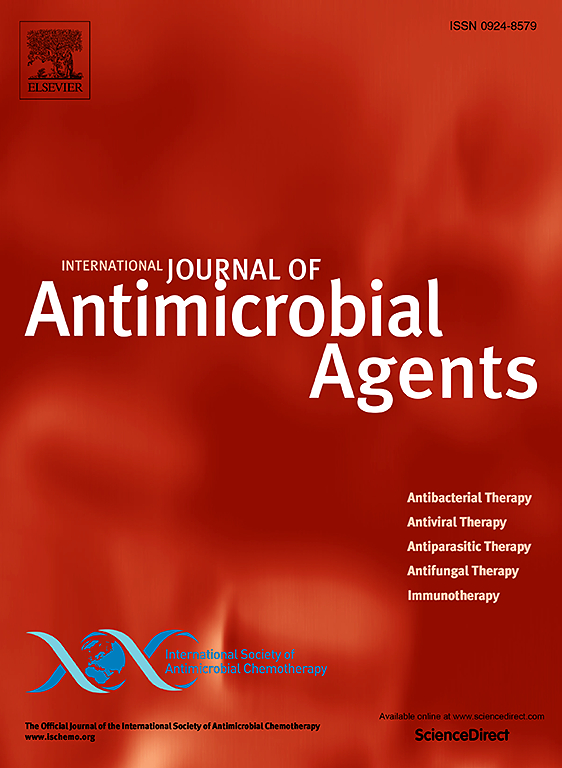通过粪便微生物群移植评估脆弱地形虫的人际传播。
IF 4.6
2区 医学
Q1 INFECTIOUS DISEASES
International Journal of Antimicrobial Agents
Pub Date : 2025-04-03
DOI:10.1016/j.ijantimicag.2025.107504
引用次数: 0
摘要
复发性艰难梭菌感染(rCDI)的粪便微生物群移植(FMT)需要仔细选择粪便供体以避免传播病原体。脆弱双阿米巴的检测仍然是一个排除标准,基于其不确定的致病性。本研究的目的是评估脆弱杆菌通过FMT的人际传播及其对rCDI临床成功的影响。对COSMIC队列中接受FMT治疗的rCDI患者进行了一项回顾性研究,以调查脆弱梭菌从供体到受体的潜在转移。还评估了涉及脆弱杆菌的FMT对rCDI临床结局和不良反应的影响。在86名自愿参加FMT项目的健康供体中,有15名(18.7%)被发现存在这种原生体。对17例脆弱单胞杆菌阳性捐献的FMT患者粪便样本中脆弱单胞杆菌的检测显示,没有证据表明通过这一过程发生人际传播。对124例接受FMT的rCDI患者的临床结果和不良事件进行分析(其中45例接受脆弱肠杆菌阳性捐赠),结果显示脆弱肠杆菌移植阳性和阴性患者的成功率无显著差异,分别为95.5%和93.6%。在分析其他副作用时未观察到显著差异。这些发现强调了在FMT过程中使用脆弱梭菌阳性供者的粪便移植的安全性。应从供体筛选中删除脆弱单胞菌,这将从财政和实际角度代表供体选择过程的重大改进。本文章由计算机程序翻译,如有差异,请以英文原文为准。
Assessment of Dientamoeba fragilis interhuman transmission by fecal microbiota transplantation
Fecal microbiota transplantation (FMT) for recurrent Clostridioides difficile infection (rCDI) requires careful selection of stool donors to avoid transmitting pathogens. Dientamoeba fragilis detection remains an exclusion criterion based on its uncertain pathogenicity. The aim of this study was to assess D. fragilis interhuman transmission by FMT and its impact on the clinical success of rCDI. A retrospective study was conducted in rCDI patients from the COSMIC cohort undergoing FMT to investigate the potential transfer of D. fragilis from donor to recipient. The impact of FMT involving D. fragilis was also evaluated in regard to the clinical outcomes of rCDI and adverse effects. This protist was found to be present in 15 of 86 healthy donors screened (18.7%) who voluntarily took part in an FMT program. Examination of D. fragilis presence in stool samples from 17 patients both before and after FMT with D. fragilis-positive donations revealed no evidence of interhuman transmission through this process. Analysis of clinical outcomes and adverse events in 124 rCDI patients who underwent FMT (with 45 receiving D. fragilis–positive donations) showed no significant differences in success rates between patients receiving positive or negative D. fragilis transplants (95.5% and 93.6%, respectively). No significant variances were observed in other side effects analyzed. These findings underscore the safety of using fecal transplant from D. fragilis–positive donors in the FMT process. D. fragilis should be removed from the donor screening, which will represent a major improvement in the donor selection process from financial and practical standpoints.
求助全文
通过发布文献求助,成功后即可免费获取论文全文。
去求助
来源期刊
CiteScore
21.60
自引率
0.90%
发文量
176
审稿时长
36 days
期刊介绍:
The International Journal of Antimicrobial Agents is a peer-reviewed publication offering comprehensive and current reference information on the physical, pharmacological, in vitro, and clinical properties of individual antimicrobial agents, covering antiviral, antiparasitic, antibacterial, and antifungal agents. The journal not only communicates new trends and developments through authoritative review articles but also addresses the critical issue of antimicrobial resistance, both in hospital and community settings. Published content includes solicited reviews by leading experts and high-quality original research papers in the specified fields.

 求助内容:
求助内容: 应助结果提醒方式:
应助结果提醒方式:


